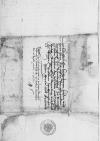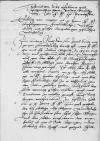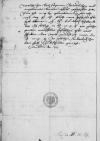Letter #5423
Ioannes DANTISCUS to Albrecht I von Hohenzollern-AnsbachLöbau (Lubawa), 1537-10-21
| received Neidenburg, 1537-10-22 Manuscript sources:
Auxiliary sources:
Prints:
| ||||||||||
Text & apparatus & commentary Plain text Text & commentary Text & apparatus
 GStA, PK, HBA, C 2, No 119, 2 unnumbered
GStA, PK, HBA, C 2, No 119, 2 unnumbered
Dem durchlauchten, hochgebornen fursten und herrn, herrn
 GStA, PK, HBA, C 2, No 119, 1 unnumbered
GStA, PK, HBA, C 2, No 119, 1 unnumbered
Durchlauchter, hochgeborner furst, hochgunstiger, lyber herr und freundt. / Unsere freuntliche, wÿllige dinst zuvoran. /
Wir schicken alhie an E(wer) F(urstliche) D(urchlauch)t den erbarn und hochgeachten
Datum aus unserm(m) sloss



